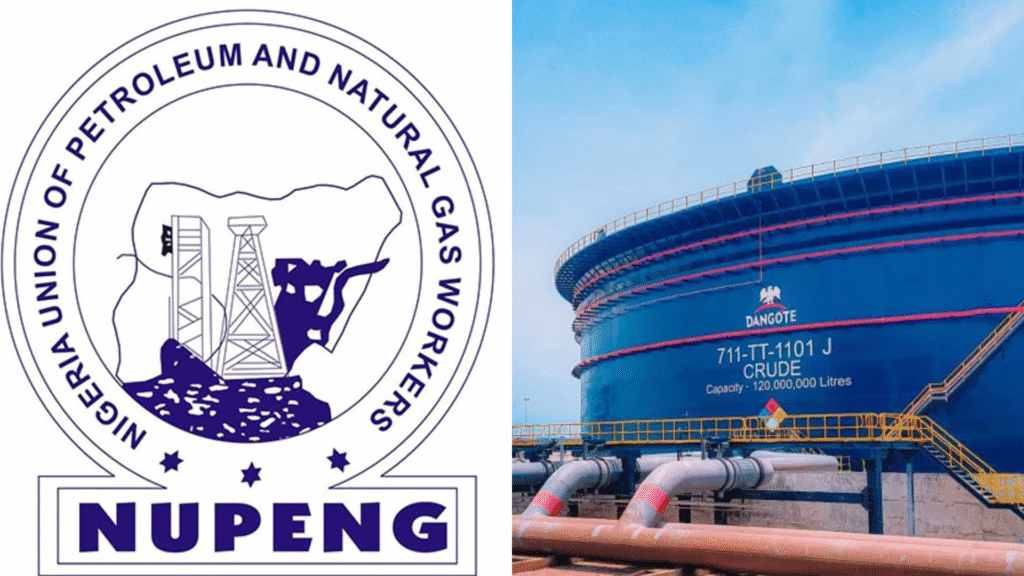The fragile truce between the Nigerian Union of Petroleum and Natural Gas Workers (NUPENG) and the $20bn Dangote Petroleum Refinery has collapsed, sparking an industrial face-off that could disrupt fuel supply nationwide and test the Federal Government’s authority over labour disputes.
The breakdown comes after NUPENG accused the Dangote Group of reneging on a Memorandum of Understanding (MoU) signed on September 9, under which tanker drivers and other workers were granted the freedom to unionise.
NUPENG President, Williams Akporeha, alleged that Sayyu Aliu Dantata, a cousin of Aliko Dangote and a key player in the refinery’s trucking operations, violated the deal within 48 hours of signing. He accused Dantata of ordering drivers to strip NUPENG stickers from their vehicles and of deploying security forces to intimidate workers.
“His wealth cannot make him above the law. Security agents should not allow an individual to ride roughshod while disregarding terms of agreement reached in meetings they facilitated,” Akporeha said.
The union has now placed members on “red alert” for a possible resumption of its nationwide strike, suspended earlier in the week.
Related Posts
NUPENG also alleged that Dangote’s management was plotting to remove union vehicles with towing trucks, prompting the union to reinforce its blockade at the refinery gates.
The row began after NUPENG accused the refinery of barring drivers of its 4,000 compressed natural gas (CNG) trucks from joining oil and gas unions, a move the union described as unconstitutional.
The refinery’s CNG trucking scheme, initially scheduled for August, was delayed but is expected to commence before year-end. NUPENG claimed drivers were compelled to sign undertakings not to unionise—a charge the refinery denies.
The standoff escalated into a strike on September 8, which was later suspended following government intervention and the signing of the MoU.
Fuel marketers, under the Petroleum Products Retail Outlet Owners Association of Nigeria (PETROAN), urged all parties to respect the truce. PETROAN President, Billy Gillis-Harry, said:
“All parties should adhere to the terms and spirit of the MoU. Attempts to renege are not in good taste. We thank the government for swiftly averting fuel scarcity.”
The Nigeria Labour Congress (NLC) described Dangote Refinery’s actions as a “gross violation.” NLC’s acting General Secretary, Benson Upah, noted that the union may consider action if violations continue. Another NLC official, speaking anonymously, accused the refinery of treating Nigerian institutions with contempt, calling it the “Dangote Republic.”
The Ministry of Labour confirmed it had not received a formal complaint, but critics argue the government risks losing credibility if it fails to enforce an agreement signed in its presence. Analysts warn the situation is a test of Nigeria’s labour laws and industrial governance.
In a rejoinder dated September 11, the refinery rejected NUPENG’s claims as “wholly inaccurate,” insisting that trade union membership remains voluntary.
“Assertions that drivers are compelled to waive union rights are categorically false,” the statement read.
Dangote also defended its CNG truck initiative, which it said would create over 60,000 direct jobs with competitive benefits, including pensions, medical cover, and housing loans. It argued that its investments have lowered fuel costs and stabilised supply, accusing NUPENG of engaging in “economic sabotage” under the guise of activism.
With NUPENG threatening to resume strike action from September 15, Nigerians fear a nationwide fuel scarcity may be imminent. Observers note that beyond fuel supply, the dispute represents a critical test of how Nigeria balances private sector power with workers’ rights and state authority.
For citizens, however, the question remains simple: will the refinery-union standoff once again push the country into fuel scarcity?
Stay tuned to 9am News Nigeria for more Breaking News, Business News, Sports updates And Entertainment Gists.
















